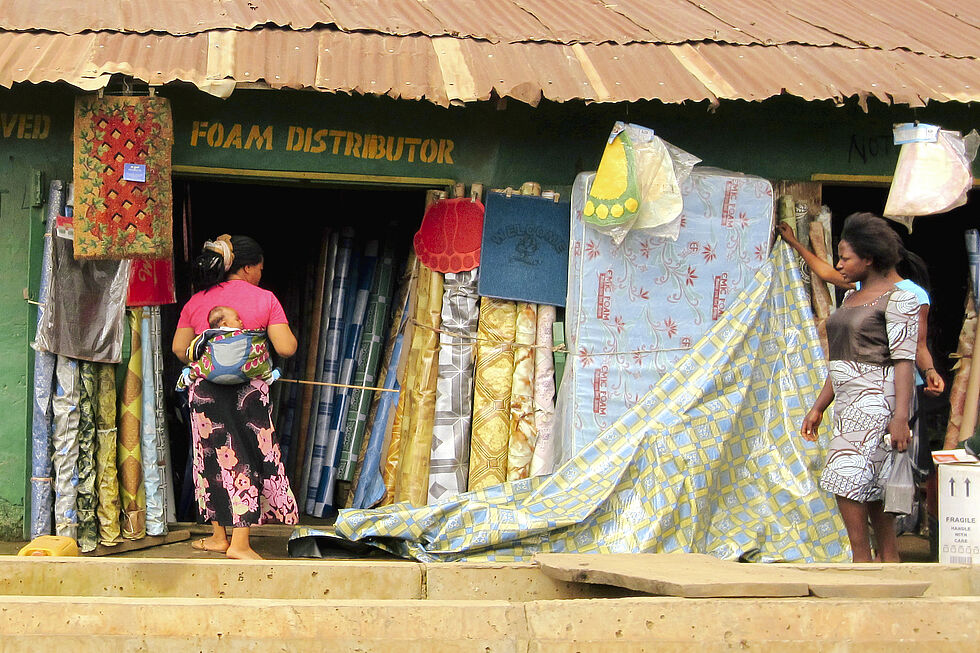In Uganda, unions are helping to drive transport workers into decent work
After decades of ever-declining numbers of formal transport workers, the ATGWU is on the up with close to 60,000 members.
Three years ago, Samuel Mugisha almost quit his job. As the driver of a motorbike taxi (known locally as a boda-boda) in the Ugandan capital of Kampala, rampant police harassment was having a huge, negative impact on his daily earnings. But today, Samuel is thriving as a member of the 38,000-member Kampala Metropolitan Boda-Boda Association (KAMBA).
Launched in January 2014, the association is one of the newest members of Uganda’s oldest trade union, the Amalgamated Transport and General Workers’ Union (ATGWU), which today is leading the drive to represent informal transport workers and help secure decent work for all of its members.
After decades of ever-declining numbers of formal transport workers, the ATGWU is on the up. It now has close to 60,000 members, with the significant intake of informal transport workers such as minibus taxi drivers, bicycle taxi drivers and boda-boda drivers giving the union a new lease of life.
“It hasn’t been easy. Many hurdles stood in the way of this formalisation, but we have covered a lot of ground so far,” says Usher Wilson Owere, the national chairman of the ATGWU. “The journey is still long but we are taking one step at a time.”
Since it was founded in 1938 as the Uganda Motor Drivers Association, the ATGWU has faced various hurdles, but perhaps the biggest threat to its existence came from the plummeting membership numbers that followed the collapse of state-owned passenger road transport services. Like elsewhere in Africa, the imposition of Structural Adjustment Programmes (SAPs) in Uganda during the mid-1980s resulted in mass job losses, particularly in the public sector. For the ATGWU, large-scale redundancies at the public bus companies that formed the bulk of its membership base decimated the union. By 2006, things were so bad that membership fell to an all-time low of around 2,000 (mainly airport worker) members.
“After structural adjustment programmes and privatisation, Uganda was [facing] a new form of raw capitalism, in which you were either rubbed out or [you had to] build your own power,” explains Owere in a new report by the German foundation Friedrich-Ebert-Stiftung (FES), titled Transforming transport unions through mass organisation of informal workers: a case study of the Amalgamated Transport and General Workers’ Union (ATGWU), Uganda.*
Regroup and rebuild
It was at this point, sometime in the mid-2000s, that the ATGWU decided to regroup and rebuild – and the inclusion of informal workers was key to this. Although it wasn’t until 2015 that the International Labour Organization (ILO) adopted the landmark Recommendation 204 to help facilitate the formalisation of the 50 per cent of workers in the world who operate in the informal economy, in 2006 the new ATGWU general secretary, Aziz Kiirya, did just that.
Kiirya knew that in order to regenerate the ATGWU, his trade union would have to organise and represent informal workers – estimates put the number of boda-boda drivers in Kampala alone at anywhere between 100,000 and 250,000, in addition to the capital’s 50,000 minibus drivers – and so he changed the union’s constitution to include them.
“The ATGWU strategy for organising informal economy workers was based on an understanding that these workers are in many cases already organised, not within the trade union movement, but through credit and savings cooperatives, informal self-help groups, community-based organisations, and, most importantly, associations,” says the report.
The Airport Taxi Operators Association was the first such association to affiliate with the ATGWU back in 2008, closely followed by a number of other national and regional organisations such as the Long Distance Heavy Truck Drivers Association and the Entebbe Stages and Conductors Association.
For Uganda’s informal transport workers, unionisation has “had a dramatic impact” according to the report, including “a reduction in police harassment, substantial gains through collective bargaining, reduced internal conflict within the associations, and improvement of visibility and status for informal women transport workers”.
Kampala’s airport taxi drivers, for example, have secured standardised branding for their taxis, an office and sales counter in the arrivals hall, proper parking facilities, and rest areas, amongst other collective bargaining gains.
Meanwhile, other members have benefited from having union membership cards, particularly when crossing borders.
The ATGWU received a major boost in 2013 when the International Transport Workers’ Federation (ITF) launched a project to improve the capacity of unions across Africa, Asia and Latin America to represent informal transport workers.
Key objectives included training organisers and also improving work conditions for women in the sector. The number of women working in the very male-dominated transport sector in Uganda is very small; KOSTA, for example, only has 45 women conductors and just 13 drivers out of a membership of approximately 36,000.
Juliet Muhebwa is one of KOSTA’s female conductors. Although the AGTWU has formed a women’s committee to support the needs of female transport workers, Juliet says they still face the same issues affecting informal women workers across the world, namely long working hours, low pay, dangerous working conditions and the threat of violence, harassment and intimidation. She describes the attitude towards women working in the sector as “largely negative, which discourages new workers” although the workshops and training has been held by the AGTWU for women workers to deal with some of these issues.
More work to do
In February 2015, the union established the ATGWU Informal Sector Committee, comprising the chairs and secretaries of all the affiliated associations. This has helped the members not only get to know one another but also to improve systems and procedures within their respective organisations.
There is still more work to do but the AGTWU has experience in overcoming major challenges. In 2013, Ugandan authorities passed a law prohibiting gatherings of more than 10 people. Although trade unions were officially exempted from the law, in August of that year, police occupied and later shut down the ATGWU’s offices where taxi drivers and conductors had gathered for a meeting the police considered illegal because they weren’t not considered ‘workers’.
The ATGWU responded strongly, threatening to call a strike and bring the whole of Kampala to a standstill if the legitimate rights of these workers were not recognised. The ITF even wrote to the Ugandan president Yoweri Museveni and as tensions threatened to escalate, the police backed down and the union called off the strike.
“The confrontation and subsequent victory proved to be a pivotal moment in the organisation of informal workers for the ATWGU,” says the report. “It was not only a victory against police interference in the business of the associations, but against the day-to-day police harassment and extortion suffered by informal transport workers.”
But even the ATGWU recognises that it has “only just scratched the surface” of what still needs to be done, ranging from the huge number of people still in the informal economy to tackling the reluctance of white collar unions to accept informal economy members as workers of equal standing.
At present, affiliated association members still do not enjoy full union membership and a lack of voting rights deprives informal workers of the right to fully participate in trade union activities. There are a number of barriers preventing this: for example, full ATGWU members must pay 2 per cent of their salary in union dues. This poses a very real problem for informal workers who experience daily income fluctuations – many don’t even have bank accounts.
“We are members but in a way we are more outsiders,” says Juliet, the bus conductor. “We want to be brought closer. It’s the only way we will get more empowered.”
The reform of the ATGWU constitution to ensure the total integration of informal workers into the ATGWU will be a key topic at the forthcoming 2017 Quinquennial Delegates Conference of the ATGWU.
But for informal workers like Frank, the difference being affiliated to the AGTWU has made to his life has been huge.
“Previously, almost half of my earnings were going into bribing police officers to let me operate. That pressure is off my back now,” says the 32-year old father of three.
Because he is able to save more money, Frank says he can now pay his childrens’ school fees. He has also been able to help his wife start a grocery business to supplement their household income.
“I was more pessimistic about the future three years ago,” he says while leaning on his crimson-red bike. “Now I see better times ahead.”
###
Diana Taremwa Karakire is a freelance journalist based in Uganda, where she works for a number of publications such as African Business Magazine, African Times and Monitor Global Outlook.
* The case study Transforming Transport Unions through Mass Organisation of Informal Workers: A Case Study of the Amalgamated Transport & General Workers’ Union (ATGWU), Uganda by Dave Spooner and John Mark Mwanika was prepared as part of the project “Trade Unions in Transformation” by Friedrich-Ebert-Stiftung. More information on the project can be found <link spotlight successfully-applying-union-power external-link-internal-icon>here, and starting in May on this website.







